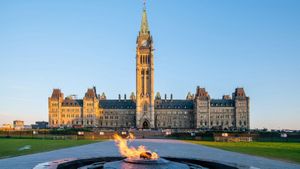Nigeria's national power grid has been making headlines again, and for all the wrong reasons. The country's electricity supply system recently experienced its tenth collapse this year, leaving citizens and businesses frustrated and powerless, both literally and metaphorically. This repeated failure of the national grid has raised serious concerns among power sector stakeholders about the future of electricity supply across the nation.
Just last week, within 24 hours of receiving a government committee report aimed at stabilizing the power grid, Nigeria faced yet another blackout. Data from the National System Operator confirmed the precarious situation: the grid's generation capabilities peaked at only 4,360.8 MW on Wednesday before plummeting to nearly nothing by midday. Even as the country attempted to get back online, it became clear just how fragile the national grid has become.
Experts warn this isn't just a temporary problem but rather the symptom of deep-rooted issues. The outdated infrastructure, inconsistent gas supply, and poor coordination among the various entities involved—such as power generation companies, gas suppliers, and local distribution companies—are wreaking havoc on the country's grid stability. Yemi Oke, Professor of Energy and Electricity Law at the University of Lagos, emphasizes the urgent need for reform, stating, "The world is actually going off-grid. I was encouraged by the position of the ministers recently, when they declared the country would look at state grids, regional grids, and other options." This sentiment is echoed by multiple stakeholders who also point to inadequate maintenance and regulatory support as contributing factors to the frequent collapses.
The recent outages, such as the one on November 7th, occurred just as the Transmission Company of Nigeria (TCN) was on the mend from previous disruptions. A sudden frequency spike led to the grid's downfall, reminiscent of previous issues caused by equipment failures. This frequency spike, attributed to problems at one of TCN's substations, required significant technical repairs, placing additional pressure on already strained resources.
Reports reveal the human toll of this blackout. Electricity distribution companies like Ikeja Electric and Eko DISCO were quick to communicate with their customers, issuing apologies for disruptions and promising restoration efforts were underway. Yet, for many Nigerians, such promises ring hollow amid repeated experiences of erratic power supply.
According to Engr. Israel Abraham, president of the Chartered Institute of Power Engineers of Nigeria, the combination of aged equipment and politically motivated decisions around infrastructure placement has led to rampant inefficiencies within the grid. The politicians are blamed for squandering opportunities to pursue expertly informed decisions about infrastructure, often allocating resources based on political favors rather than utility needs.
Adding to the strain, operators are notorious for doing little to rehabilitate equipment or expand capacity. Most older systems are ill-equipped to handle Nigeria's growing population and their resultant energy demands. The grid's infrastructure requires significant investment to repair and replace outdated components, which are often decades old and desperately need modernization.
Nigeria's dire power situation is exacerbated by political and financial challenges. The need for substantial funding to modernize equipment often meets resistance or slow progress, leading to speculation about whether the routine grid failures will ever be adequately resolved. Experts suggest investing time and resources now can save decades of struggles later on, emphasizing the importance of regulatory oversight and accountability.
To make matters worse, several power generation companies have reported considerable financial losses, stemming from constant shutdowns and equipment damage due to frequent collapses. One official stated, "If you know how much we have lost commercially, you won’t be asking… and that's not counting the damages done to our machines by the frequent shutdowns.” This statement highlights the deteriorated state of the industry, where financial instability threatens the future of power generation across Nigeria.
Reflecting on the state of rural electrification, Professor Oke criticizes the existing Rural Electrification Agency (REA). He suggests scrapping it and reallocates resources to states to independently manage electrification projects. He believes the closest level of government to the rural areas can more effectively handle energy needs than centralized agencies burdened by red tape.
Fortunately, the narrative is not all bleak; there are signs of potential solutions. Oke argues for the urgent development of decentralized, off-grid electricity solutions as a way forward. He envisions staggered approaches where states can invest and develop their own smaller grids. Such regional efforts could alleviate the pressure on the national grid and serve their local populations more effectively.
This shift toward more localized energy systems aligns with global trends emphasizing autonomy and self-sustainability. Solutions such as solar energy or bioenergy could offer immediate relief for many communities currently reliant on an unstable national grid. This could also stimulate investment opportunities, attracting cautious investors willing to fund innovative energy projects within more stable frameworks.
Several of Nigeria's state governments have started to realize the potential benefits of these decentralized systems and are taking steps to implement them. For states like Lagos, which face substantial power shortfalls, developing localized solutions appears to be not just necessary, but inevitable. The urgency to establish alternative power systems is palpable.
Power sector analysts stress the importance of immediate action, particularly as the weather patterns grow increasingly unpredictable. Securing alternative energy sources could also position Nigeria favorably as it grapples with climate challenges. Many stakeholders assert the necessity of elevational infrastructure's resilience against natural disasters, mitigating the risk of future emergencies.
Looking forward, the mounting issues surrounding Nigeria's power infrastructure indicate the time for mere band-aid solutions is over. Explicit reforms, collaboration across sectors, and prioritizing local energy initiatives appear imperative for stabilizing the grid and ensuring consistent power supply. Observers agree there's no silver bullet; addressing these complex problems requires dedication and sustained efforts from all levels of government, the private sector, and civil society.
While the road to recovery for Nigeria's power sector is fraught with challenges, there is hope. Community-driven energy initiatives, technological advances, and committed policy reform could turn the tide. The question remains: will Nigeria muster the political will to redirect its energy policies toward decentralization and modernization? The urgency for action has never been clearer, and many people simply can’t wait any longer.



